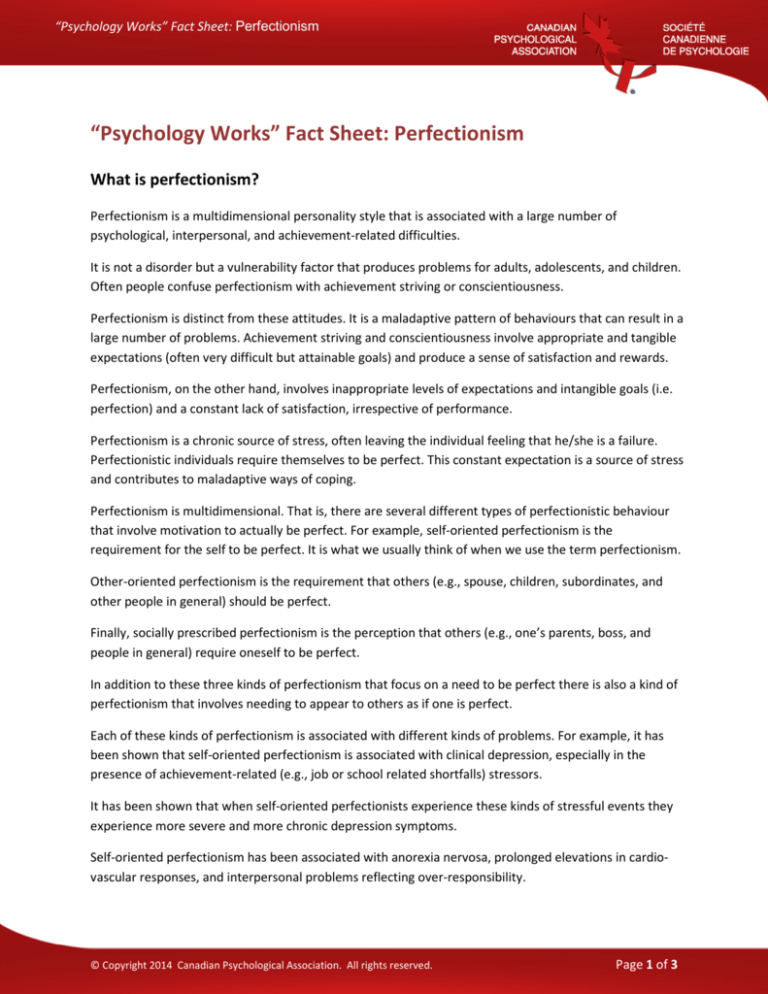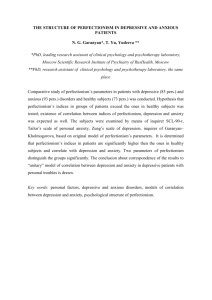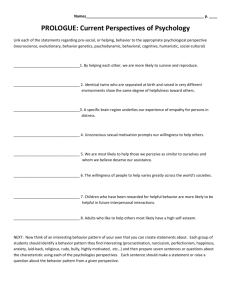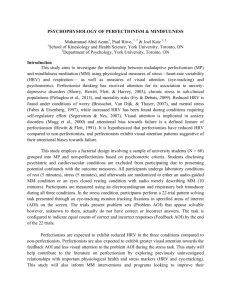
“Psychology Works” Fact Sheet: Perfectionism
“Psychology Works” Fact Sheet: Perfectionism
What is perfectionism?
Perfectionism is a multidimensional personality style that is associated with a large number of
psychological, interpersonal, and achievement-related difficulties.
It is not a disorder but a vulnerability factor that produces problems for adults, adolescents, and children.
Often people confuse perfectionism with achievement striving or conscientiousness.
Perfectionism is distinct from these attitudes. It is a maladaptive pattern of behaviours that can result in a
large number of problems. Achievement striving and conscientiousness involve appropriate and tangible
expectations (often very difficult but attainable goals) and produce a sense of satisfaction and rewards.
Perfectionism, on the other hand, involves inappropriate levels of expectations and intangible goals (i.e.
perfection) and a constant lack of satisfaction, irrespective of performance.
Perfectionism is a chronic source of stress, often leaving the individual feeling that he/she is a failure.
Perfectionistic individuals require themselves to be perfect. This constant expectation is a source of stress
and contributes to maladaptive ways of coping.
Perfectionism is multidimensional. That is, there are several different types of perfectionistic behaviour
that involve motivation to actually be perfect. For example, self-oriented perfectionism is the
requirement for the self to be perfect. It is what we usually think of when we use the term perfectionism.
Other-oriented perfectionism is the requirement that others (e.g., spouse, children, subordinates, and
other people in general) should be perfect.
Finally, socially prescribed perfectionism is the perception that others (e.g., one’s parents, boss, and
people in general) require oneself to be perfect.
In addition to these three kinds of perfectionism that focus on a need to be perfect there is also a kind of
perfectionism that involves needing to appear to others as if one is perfect.
Each of these kinds of perfectionism is associated with different kinds of problems. For example, it has
been shown that self-oriented perfectionism is associated with clinical depression, especially in the
presence of achievement-related (e.g., job or school related shortfalls) stressors.
It has been shown that when self-oriented perfectionists experience these kinds of stressful events they
experience more severe and more chronic depression symptoms.
Self-oriented perfectionism has been associated with anorexia nervosa, prolonged elevations in cardiovascular responses, and interpersonal problems reflecting over-responsibility.
© Copyright 2014 Canadian Psychological Association. All rights reserved.
Page 1 of 3
“Psychology Works” Fact Sheet: Perfectionism
Other-oriented perfectionism has been associated with relationship problems, such as poor marital
satisfaction, sexual dissatisfaction, and anger toward others.
Socially prescribed perfectionism has been associated with a variety of symptoms including anxiety,
depression, eating disorder symptoms, and hostility.
Most importantly this dimension of perfectionism has been found to predict not only suicide thoughts
and behaviours in adults and adolescents, but also serious suicide attempts.
Furthermore, there are a variety of achievement-related problems that arise from this kind of
perfectionism such as procrastination and self-handicapping (i.e., where individuals spend time finding
excuses for poor performance rather than preparing for a performance).
Finally, perfectionistic self-presentation involves a variety of difficulties such as precluding one from
seeking appropriate help for difficulties and not benefiting fully from treatment due to great difficulties in
self-disclosing personal information.
How can psychology help?
Because perfectionism is a personality style, treatment tends to be fairly intensive and longer term.
Recent research reports and clinical experience has indicated that it takes a fairly lengthy course of
psychotherapy (often more than a year) and the therapy tends to be intensive.
Several Canadian studies are currently underway that focus on both fine-tuning current treatment
approaches and evaluating the effectiveness of these treatment in alleviating perfectionism and its
attendant difficulties.
Where do I go for more information?
For more information visit the following:
•
•
The Anxiety Disorders Association of Canada at http://www.anxietycanada.ca.
AnxietyBC at http://www.anxietybc.com.
You can consult with a registered psychologist to find out if psychological interventions might be of help
to you. Provincial, territorial and some municipal associations of psychology often maintain referral
services. For the names and coordinates of provincial and territorial associations of psychology, go to
http://www.cpa.ca/public/whatisapsychologist/PTassociations/.
This fact sheet has been prepared for the Canadian Psychological Association by Dr. Paul Hewitt,
University of British Columbia.
Revised: January 2009
© Copyright 2014 Canadian Psychological Association. All rights reserved.
Page 2 of 3
“Psychology Works” Fact Sheet: Perfectionism
Your opinion matters! Please contact us with any questions or comments about any of the Psychology
Works Fact Sheets: factsheets@cpa.ca
Canadian Psychological Association
141 Laurier Avenue West, Suite 702
Ottawa, Ontario K1P 5J3
Tel: 613-237-2144
Toll free (in Canada): 1-888-472-0657
© Copyright 2014 Canadian Psychological Association. All rights reserved.
Page 3 of 3









